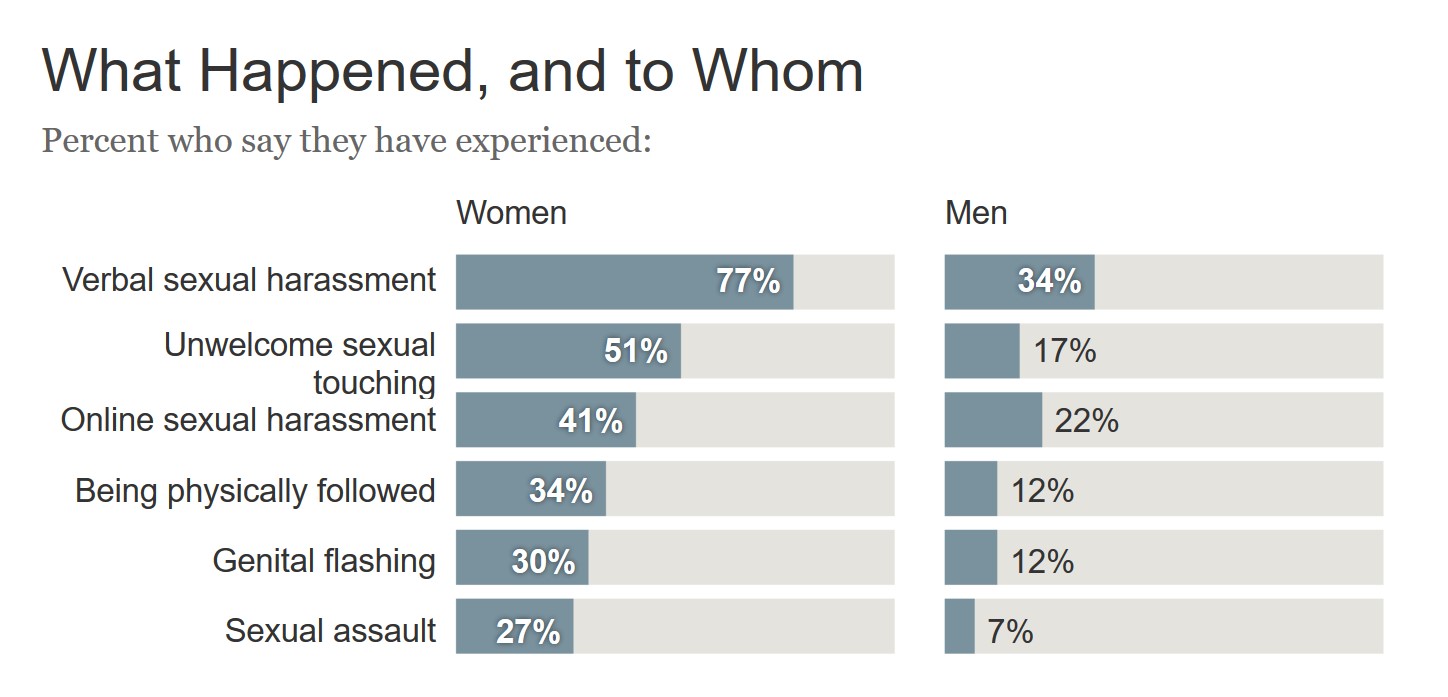Patrick Hogan, Chicago, IL, USA, SSH Blog Correspondent
 Stalking is perhaps one of the most frightening forms of street harassment. It’s an experience that 1 in 5 women have experienced in public spaces by a stranger and 1 in 3 women have experienced, period (by known persons or strangers).
Stalking is perhaps one of the most frightening forms of street harassment. It’s an experience that 1 in 5 women have experienced in public spaces by a stranger and 1 in 3 women have experienced, period (by known persons or strangers).
The University of Michigan’s Sexual Assault Prevention and Awareness Center describes six types of stalkers based on stalker’s motivations: “rejected stalker”, “resentful stalker”, “predatory stalker”, “intimacy seeker”, “Incompetent suitor”, and “erotomania and morbidly infatuated.” The University’s Center also notes that “Even though there are general categories of stalkers, that does not mean that every stalker will fit neatly into a category. Stalkers can have any characteristics and come from any type of background.”
Whether a stalker is an ex-romantic partner, delusional and infatuated with a victim, or a stranger intending violence, the dangers of being stalked need not be reiterated.
For this piece, three women shared their experiences as stalking survivors in the hopes that their experiences may help inspire action.
Woman #1 was riding a public train home after spending the day downtown Chicago visiting family when a man moved from one side of the train car to sit next to her. She thought this behavior was weird, but did not think much of it. The man proceeded to talk to her, at first friendly, starting with a greeting and a discussion of the weather. What had started as a pleasant discussion rapidly deteriorated as the man began making sexual comments about her body. She was clearly uncomfortable, and got up to leave the train at the next stop. The man got up to leave with her. They both left the train and the man continued the barrage of inappropriate comments. She swiftly walked down the platform away from the man, past other people, as he followed her. Finally, she slipped a canister of pepper spray out of her purse, turned, and aimed the pepper spray canister directly between the man’s eyes. His eyes got wider as he realized what was looking at, and turned to run away.
Woman #2 was leaving a business lunch, walking down a busy side walk to return to her car parked a block away. A man walked up to her and began inquiring into her relationship status. She told him she was uncomfortable with his questioning. His response: “You bitch! F**k you!” She jogged away as he shouted and followed her. She ran into a coffee shop and he did not follow her in.
Woman #3 was walking home from her gym when three men began to follow her no more than 100 meters behind. When she noticed them tailing her, she turned around to confront them, asking, “What? What do you want?” The men laughed and one shouted back: “You, whore!” The men kept following her while other pedestrians moved to the adjacent sidewalk so as not to walk past the men. She called 911, and notified the men with another shout, “I’m calling the cops!” She ducked into a nearby store, and then men did not follow her in.
All three instances demonstrated startling and tragic commonalities: the women, who were each alone, were stalked in broad day light and in crowded public areas, but they did not receive any assistance from anyone else. People could have helped them, but no one did. Perhaps people were scared, perhaps they did not know how to intervene, perhaps they do not want to do the right thing. Whatever the reason, it was not a good enough reason for staying silent.
These women stood up for themselves but the men lashed out or escalated their behavior. The onus cannot be on persons who are facing harassment and stalking alone to stop incidents. These women offer their stories as a lesson to us all—to you, the reader. Be an active bystander; do not allow people to fear for their lives if you can do something to help them. If one person stands by to help a victim, others may join in.
Complacency and apathy cannot be accepted when someone else’s safety is endangered by a stalker. Hopefully, in the #MeToo era, similar testimonies will end with victims being helped and the harassers sent away. But that can only happen if people–individuals, you and I–stand up as advocates, choosing to get involved rather than shying away when harassment happens in front of us.
Patrick is an undergraduate student majoring in anthropology and minoring in Islamic World Studies at Loyola University Chicago, preparing to continue onto law and graduate school. He is particularly interested in legal anthropology and the ways victims are viewed by legal systems.

